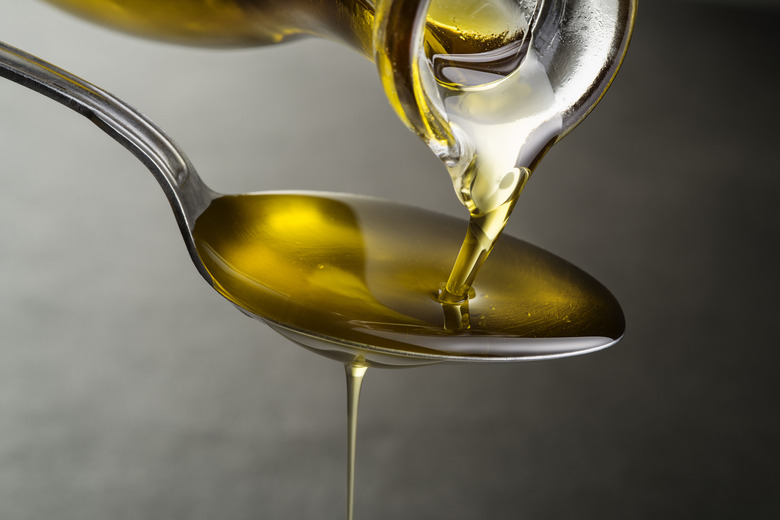What Effect Does Vegetable Oil Have On Plants?
We may receive a commission on purchases made from links.
There are a lot of good reasons to have a garden. It's a pleasantly low-impact form of exercise, it's relaxing and, in general, it's good for your mental and physical health. Growing your own flowers, herbs and vegetables also gives you control over how they're grown, which — for many people — means using sustainable methods and shunning the use of synthetic herbicides and pesticides. Those methods often include the use of natural household ingredients like vegetable oil in place of those harsh chemicals. It's safe to use on plants but effective against some insect pests.
Tip
Vegetable oil doesn't have a significant effect on plants, but it can work well as a low-toxicity treatment for insect pests.
Does Vegetable Oil Harm Plants?
Does Vegetable Oil Harm Plants?
Just because a product is "natural" doesn't mean it's necessarily safe. Often, it just means it's less harmful than its mainstream equivalents. In the case of vegetable oil, you shouldn't see any significant effect on your plants. A study published in Organic Agriculture in March 2019 tested a variety of common vegetable oils on common crops and weeds, spraying them repeatedly at full strength.
While the study found the oils did inhibit growth slightly, especially when it was applied during the hotter parts of the year, the overall effect wasn't enough to be worthwhile as an herbicide for farming purposes. That's good news if you want to use it as a pesticide, rather than an herbicide. If repeated sprayings with full-strength oil barely discouraged growing plants, the lower concentrations used in a backyard garden should be perfectly safe. That said, it's still prudent to test any DIY spray on a few leaves of each target plant. If those wilt, don't use your oil mixture on that specific kind of plant.
Vegetable Oil as a Pesticide
Vegetable Oil as a Pesticide
Vegetable oil is an effective treatment for soft-bodied insect pests, including aphids, mites and thrips. They breathe through their bodies, rather than their mouths, so when they're coated in oil, it effectively smothers them. It can also interfere with pests' earlier life stages, smothering larvae in the same way and, in some cases, preventing eggs from maturing and hatching.
Using Vegetable Oil on Pests
Using Vegetable Oil on Pests
The standard ratio for a vegetable oil spray is 1 cup of oil to 1 gallon of water. The North Carolina State University Cooperative Extension reports that cottonseed oil is most effective as an insecticide. If you're unable to find this oil locally, you can order it online. The Extension's second recommendation is soybean oil, which offers fair to good insect and mite control.
Assuming you've tested the mixture on a few leaves and found no damage, go ahead and spray. Mist your plants thoroughly to cover the tops and bottoms of the leaves as well as stems and branches (many pests hide on the undersides of leaves). Use enough to wet the plant thoroughly, but not to the point that it's dripping. The mixture works only when it's wet, so dusk is a good time to spray because the mixture won't dry up as quickly. Also, plants tolerate it better when it's not too hot.
Vegetable Oil and IPM
Vegetable Oil and IPM
Natural controls work best when they're incorporated into a "big picture" strategy, usually referred to as "integrated pest management," or IPM. The goal of IPM is to use the least harmful interventions needed to protect your garden, and vegetable oil fits neatly into that scheme of things. One of the big pillars of IPM is the encouragement of natural control through beneficial predator insects, and an oil spray — while damaging to soft-bodied pests — is innocuous to hard-bodied predators such as ladybug beetles and wasps.
Hand-picking pests from affected plants is an alternative to spraying, when your plants aren't heavily infested. Picking bugs and larvae from the plants and drowning them in a bucket filled with soapy water and a splash of oil is an effective control. A splash of vegetable oil in the bottom of a small tuna or cat-food can, "perfumed" with bacon fat or the oil from a can of sardines, makes an effective earwig trap. Adding a few drops of oil to other bait traps, like the beer traps often used for slugs, helps prevent the pests from climbing back out.
References
- Organic Agriculture: The Potential of Culinary Vegetable Oils as Herbicides in Organic Farming: The Effect of Oil Type and Repeated Applications on Plant Growth
- Los Angeles County Public Works: Integrated Pest Management (IPM): Natural Solutions to Pests
- University of Massachusetts Amherst: Managing Earwigs and Slugs in the Vegetable Garden
- EarthEasy: Natural Garden Pest Control
- North Carolina State University Cooperative Extension: Insect Management
